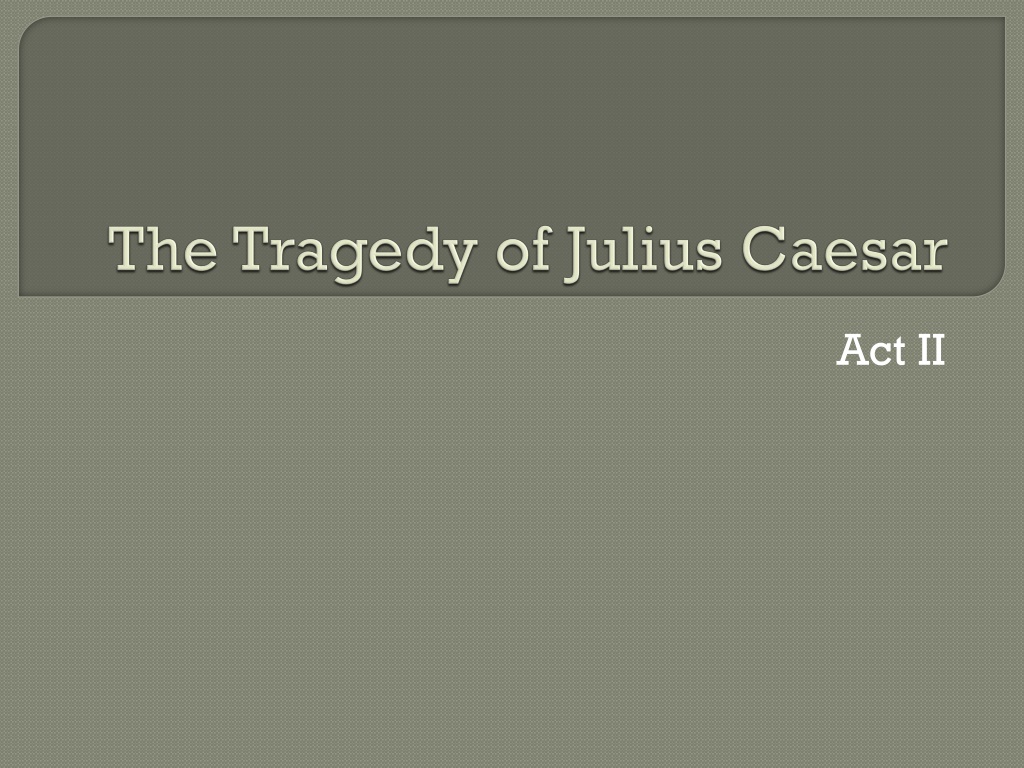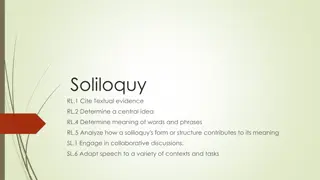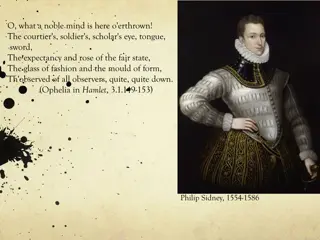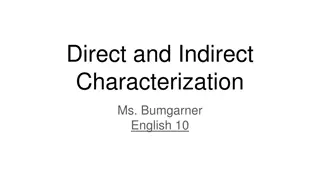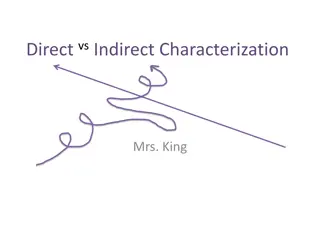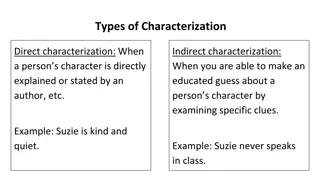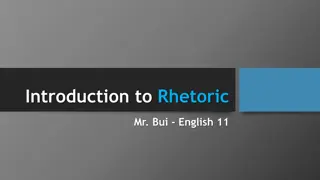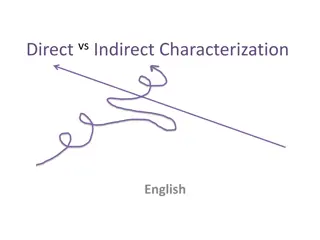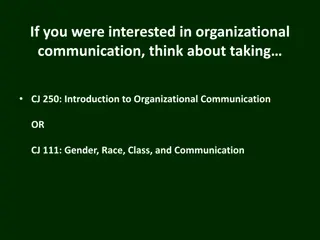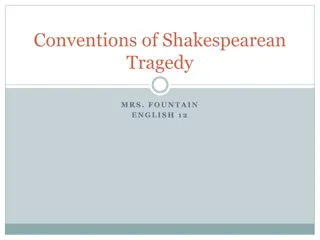Understanding Rhetoric and Characterization in Shakespearean Works
Delve into the realm of rhetoric, exploring the concepts of logos, pathos, and ethos alongside the art of persuasion through language. Uncover the nuances of blank verse in Shakespearean poetry and the significance of characterization in revealing the depths of characters in his plays.
Download Presentation

Please find below an Image/Link to download the presentation.
The content on the website is provided AS IS for your information and personal use only. It may not be sold, licensed, or shared on other websites without obtaining consent from the author. Download presentation by click this link. If you encounter any issues during the download, it is possible that the publisher has removed the file from their server.
E N D
Presentation Transcript
Rhetoric Logos Pathos Ethos Blank Verse
The art or study of using language effectively and persuasively. [American Heritage College Dictionary] Rhetoric may be defined as the faculty of observing in any given case the available means of persuasion. [Aristotle]
There are three types of appeals people use to communicate: Ethical (Ethos): the speaker/writer uses language to gain the listener s/reader s trust Logical (Logos): the speaker/writer uses facts, details, and information to create a rational argument. Emotional (Pathos): the speaker/writer uses emotionally charged words and phrases to move the listener/reader.
Situation Persuade the teacher to let you go the bathroom because you have to send a very important text message. Persuade a police officer to let you off without a ticket because you were trying to make it to the ice cream stand before it closed. Ethos Pathos Logos
Blank Verse: unrhymed poetry written in Iambic Pentameter Iambic unaccented syllable followed by an accented syllable Pentameter five feet per line (a foot is one beat set in the pattern of accented/unaccented syllables) Example: By all/ the gods/ that Ro/mans bow/ before I here/discard/my sick/ness! Soul/ of Rome Shakespeare uses blank verse to establish character rank in the play Blank verse is generally used for the dialogue of aristocratic/high ranking characters
Focus on Brutus After each detail characterizing Brutus, choose the letter of the best interpretation.
Characterization is the process by which a writer reveals the personality of a character. Some methods of characterization in Shakespearean plays are letting the audience hear the character speak revealing the character's private thoughts through speeches heard by the audience alone showing how other characters react toward the character.
But for the general. He would be crowned. How that might change his nature, there's the question." (Scene 1, lines 10-13) a. Brutus is eager to kill Caesar and take his place. b. Brutus has no strong personal dislike of Caesar.
Arriving with other conspirators, Cassius tells Brutus, ". . . no man here But honors you; and every one doth wish You had but that opinion of yourself Which every noble Roman bears of you." (Scene 1, lines 90-93) a. Brutus is highly respected in Rome. b. Brutus is held in low esteem in Rome.
a. Brutus is a man who believes in keeping his word. b. Brutus is afraid to have the gods witness the agreement.
Cassius argues that Mark Antony should also be killed, but Brutus argues against it (Scene 1, lines 162-183). a. Brutus is timid and fearful. b. Brutus will consider an execution but not a bloodbath
Who said the following: And therefore think him as a serpent s egg Which, hatched, would as his kind grow mischievous And kill him in the shell ? Why is this line important? What does it tell us?
BRUTUS Let 'em enter They are the faction. O conspiracy, Shamest thou to show thy dangerous brow by night When evils are most free? O, then by day Where wilt thou find a cavern dark enough To mask thy monstrous visage? Seek none, conspiracy. Hide it in smiles and affability. What is Brutus saying? What should be hidden in smiles and affability ?
Captain: Brutus Major Players: Cassius, Casca, Decius, Cinna, Metellus, Trebonius What about Cicero? Should he be on the team?
DECIUS But should we only go after Caesar? No one else? DECIUS Shall no man else be touched but only Caesar? CASSIUS Decius, well urged. I think it is not meet Mark Antony, so well beloved of Caesar, Should outlive Caesar. We shall find of him A shrewd contriver. And, you know, his means, If he improve them, may well stretch so far As to annoy us all; which to prevent, Let Antony and Caesar fall together. But What does Brutus Say? CASSIUS Good point, Decius. I don t think it would be wise to let Mark Antony, whom Caesar is so fond of, outlive Caesar. We d find that he was a dangerous plotter. And as you know, his connections, if he put them to good use, might be enough to hurt us all. To prevent this, Mark Antony should die along with Caesar
1. Chain of Being: When the natural world is out of order because the God s are unhappy or are planning unfortunate events Find quote that shows Calpurnia believes in chain of being. 2. Does Caesar accept his death as inevitable? Cowards die many times before their deaths; The valiant never taste of death but once Seeing that death, a necessary end, Will come when it will come. Pg. 73 3. Is Caesar going to go to the Capitol? Why or Why not?
1. Create a list of all of the warning signs that Caesar ignores. What does this suggest about his character? 2. Describe Calpurnia s dream and Decius s reinterpretation of the dream. 3. How does Decius get Caesar to change his mind? What mode of rhetoric? Thus, what might be considered Caesar s tragic flaw? 4. What type of irony unfolds? How does this affect the audience? 5. Compare and contrast Calpurnia and Portia.
Artemidorus tries to warn Caesar with a letter, If thou beest not immortal, look about you (3.1.6) Do you think Caesar will listen? 2.4 Group Question Builds suspense Portia waits around nervously outside the Capitol Why do we hardly see any women in the play?
Finish your notes: Write a summary of Act 2 of four sentences, one for each scene.
Scene 1 Instructions: Write down the questions. Answer them in your notebook (finish for homework) and study them for the quiz on this Act.
CASSIUS Why, the man who shortens his life by twenty years cuts off twenty years of worrying about death. CASSIUS Why, he that cuts off twenty years of life Cuts off so many years of fearing death BRUTUS Grant that, and then is death a benefit. So are we Caesar s friends, that have abridged His time of fearing death. Stoop, Romans, stoop, And let us bathe our hands in Caesar s blood Up to the elbows, and besmear our swords. Then walk we forth, even to the marketplace, And waving our red weapons o'er our heads Let s all cry, Peace, freedom, and liberty! (3.1.180)
ANTONY O mighty Caesar! dost thou lie so low? Are all thy conquests, glories, triumphs, spoils, Shrunk to this little measure? Fare thee well. I know not, gentlemen, what you intend, master spirits of this age. 2. What is Antony s Reaction?
BRUTUS Though now we must appear bloody and cruel, As by our hands and this our present act, You see we do, yet see you but our hands. And this the bleeding business they have done: Our hearts you see not; they are pitiful To you our swords have leaden points, Mark Antony. 3. What is Brutus trying to tell Antony? 4. Why does Antony shake hands with all the men?
ANTONY Friends am I with you all and love you all, Upon this hope, that you shall give me reasons Why and wherein Caesar was dangerous. BRUTUS Or else were this a savage spectacle: Our reasons are so full of good regard That were you, Antony, the son of Caesar, You should be satisfied. ANTONY That's all I seek: And am moreover suitor that I may Produce his body to the market-place; And in the pulpit, as becomes a friend, Speak in the order of his funeral. CASSIUS (whispers to Brutus) You know not what you do: do not consent That Antony speak in his funeral: Know you how much the people may be moved By that which he will utter? 5. WHY DOESN T CASSIUS THINK ANTONY SHOULD SPEAK AT THE FUNERAL?
BRUTUS By your pardon; I will myself into the pulpit first, And show the reason of our Caesar's death: What Antony shall speak, I will protest Brutus Don t worry about it. I m going to speak first and explain why I had to kill Caesar. I won t let Antony say anything bad about us. CASSIUS I don t know what s going to happen I don t like it though CASSIUS I know not what may fall; I like it not. BRUTUS Mark Antony, take Caesar s body. You will not blame us in your funeral speech, but will say all the good you want to about Caesar and that you do it by our permission. Otherwise, you ll have no role at all in his funeral. And by the way, you ll speak on the same stage as I do, after I m done. BRUTUS Mark Antony, here, take you Caesar's body. You shall not in your funeral speech blame us, But speak all good you can devise of Caesar, And say you do't by our permission; Else shall you not have any hand at all About his funeral: and you shall speak In the same pulpit whereto I am going, After my speech is ended.
(CORNELL) 7. What did Brutus say to the people at the funeral? Identify at least two examples of ethos, pathos, or logos in his speech. (Answer in your notes)
(CORNELL) 8. What did Antony say to the people at the funeral in his now famous "Friends, Romans, countrymen, lend me your ears" speech? Identify at least two examples of ethos, pathos, or logos in his speech. (answer in your notes)
(CORNELL) 9. Why did Brutus and Cassius flee Rome? 10. What is the point of Act III Scene III? (answer here)
(CORNELL) - OPTIONAL Who approaches Caesar with his letter indicating all the conspirators and how they plan to kill Caesar? (answer) Who draws Antony away so that he will not be able to defend Caesar when they decide to kill him? In the moments following Caesar's death, what do the conspirators proclaim to justify their deed? Antony's servant brings a message to Brutus. What does he say? Under what conditions will Antony speak at the funeral? After the conspirators talk with Antony he remains alone and asks Caesar to pardon him for what?
